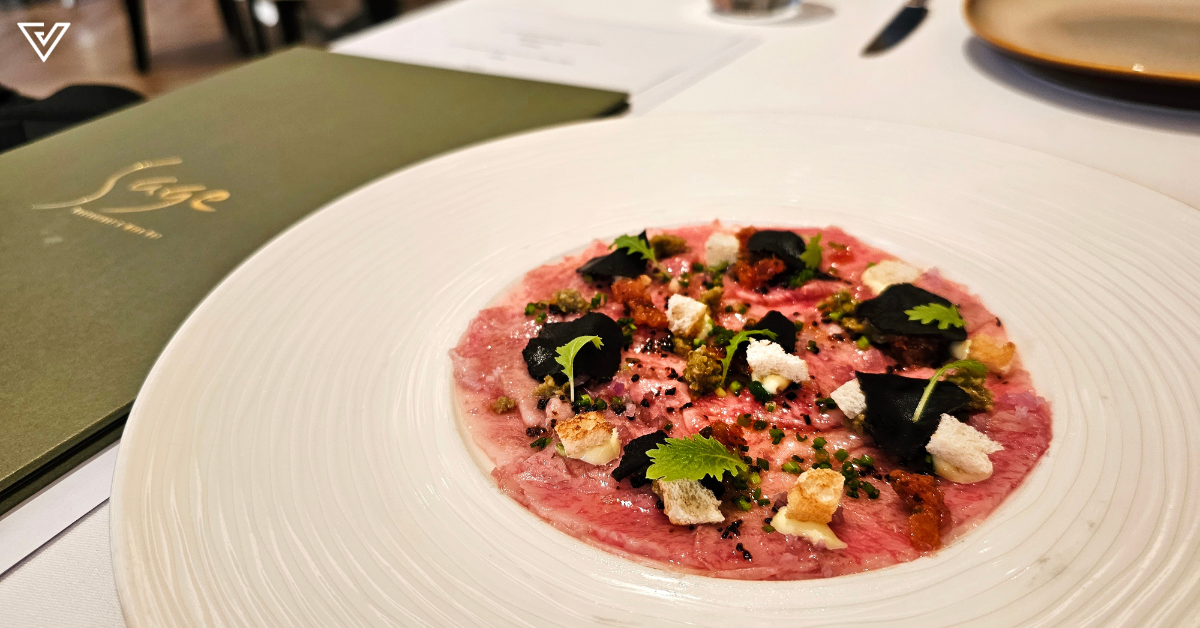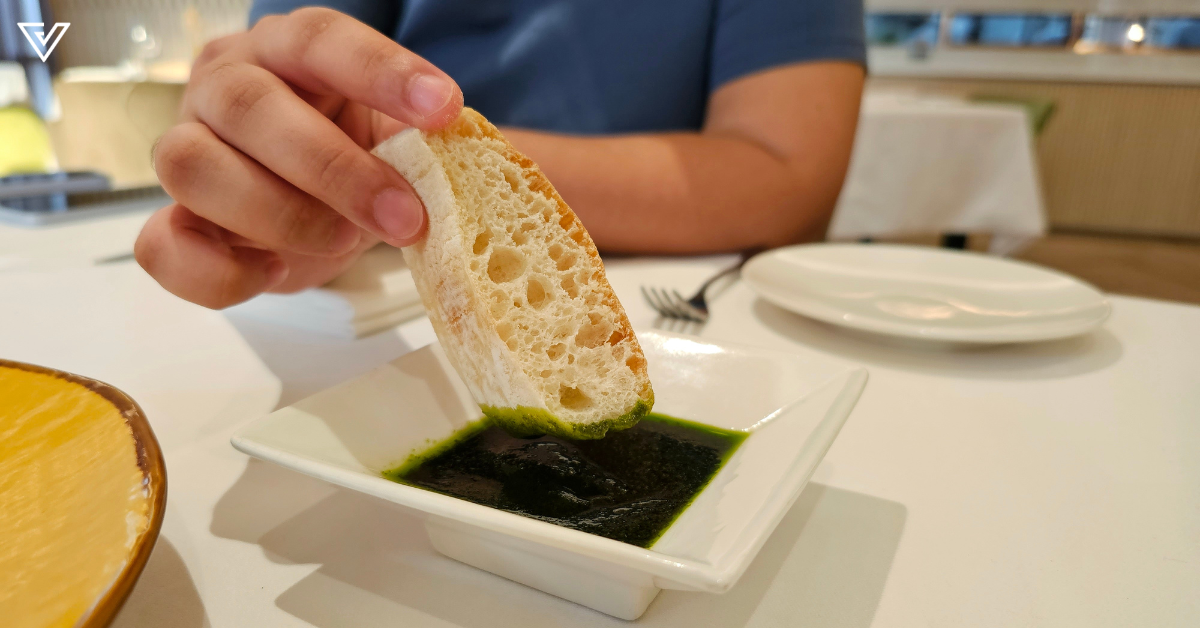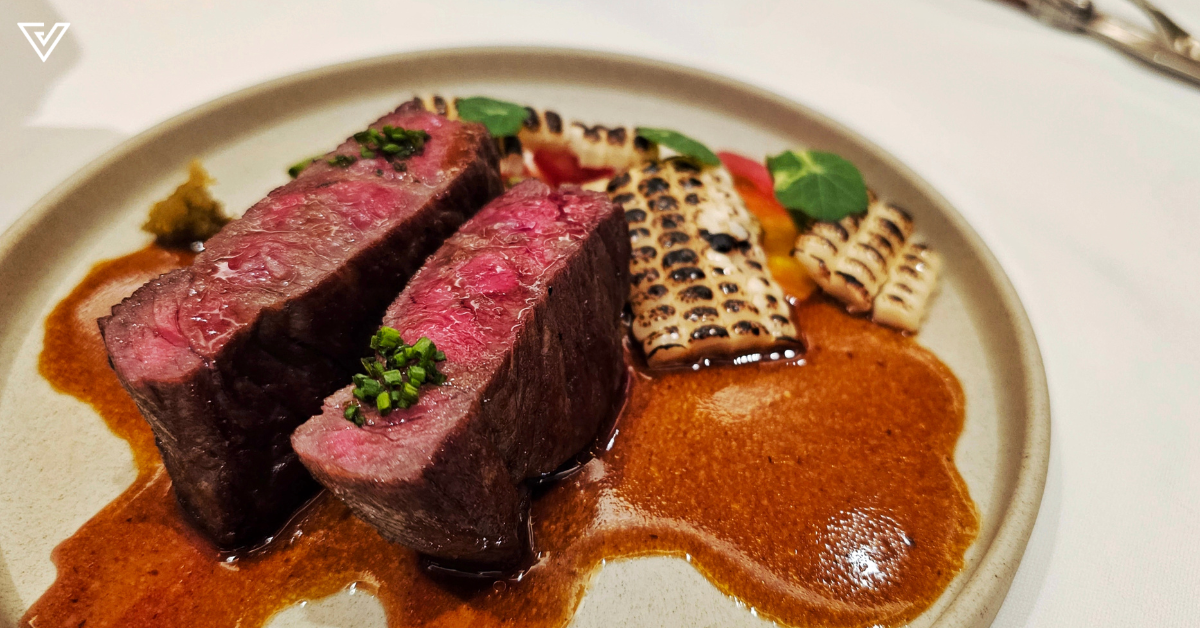Real Madrid CF has launched an accelerator seeking M’sian startups, here’s how to join

Football lovers, here’s a chance to potentially work with the iconic Spanish football club, Real Madrid CF.
Optin Studio, a Kuala Lumpur-headquartered innovation venture firm, announced the launch of the Real Madrid Next Accelerator for Asia Program.
This is done in partnership with Real Madrid Next and Creww Inc., a Japan-based startup community platform that seeks to support people who want to create new and innovative businesses.
To catalyse innovation within the sports industry across Asia, the Real Madrid Next Accelerator for Asia Program is inviting early to mid-stage Asian startups across diverse verticals to join its programme.
Selected startups will gain access to opportunities for business partnerships, potential funding, and investment, alongside Optin Studio’s support in sourcing and nurturing Malaysian startups poised for global expansion within the football and sports business realm.
“We recognise the immense talent and potential present within our local grassroots entrepreneurial community,” said Farah Fauzi, the Co-Managing Partner at Optin Studio.
“The Real Madrid Next Accelerator for Asia can serve, at the very least, as one of the exposure opportunities for our local homegrown talent to venture out into the regional and global scene, especially within the sports tech sector.”
What’s Next?
This accelerator programme is organised through Real Madrid Next, the technological innovation arm of Real Madrid FC.

According to its website, Real Madrid Next is the football club’s commitment to excellence in all its operational areas.
Through Next, Real Madrid will carry out “unique technological innovation projects” that can generate an ecosystem that fosters the advancement of the sports industry, specifically focusing on disruptive solutions.
“Real Madrid Next will focus on generating synergies with startups and leading companies in its sector by providing resources and sharing its knowledge in all aspects related to sports,” the website stated.
With this in mind, the Real Madrid Next Accelerator for Asia Program will focus on six key themes: sports performance, e-health, audiovisual (AV) content, fan engagement, cybersecurity, and social impact.
Selected participants will receive support and resources from Real Madrid, as well as the chance to showcase their innovations at an all-expenses-paid Real Madrid Next Accelerator for Asia Demo Day in Spain later this year.
Applications are open until April 15, 2024.
In conjunction with the programme, Optin Studio has curated a series of engagement sessions, commencing with an online “kick-off” event on April 3, 2024, tailored for aspiring startup founders and teams.
Interested parties can register for the sessions online. Meanwhile, more information about the programme can be found here.
Football as a way forward
As Wan Dazriq, Co-Managing Partner at Optin Studio, pointed out, “Football has a global appeal and is considered as one of the economic and social powerhouses in the sports industry.”
Indeed, it’s obvious that football is a huge industry, with Spain’s La Liga alone generating billions of revenue every year.
And amongst the football teams in the Spanish league, Real Madrid is one of the best-known ones.
For the uninitiated, Real Madrid has won the UEFA Champions League more than any other club, with a total of 14 titles. As a refresher, Cristiano Ronaldo had been associated with the team for nearly a decade.
The sports industry in Malaysia is something that our government has been working to groom too. For one, the 12th Malaysia Plan (12MP) announced the development of a Sports Industry Centre of Excellence to grow the local industry. The plan also highlighted sports as a way to improve wellbeing in the country.
Bearing all this in mind, it’s a no-brainer that the Real Madrid Next Accelerator for Asia Program is a great opportunity for those in the sports sector and for our sports industry overall to grow.
- Learn more about the Real Madrid Next Accelerator for Asia Program here.
- Read other articles we’ve written about Malaysian startups here.
Also Read: Why M’sians need to join this 2-day event in PJ that’ll boost your understanding of IPs
Featured Image Credit: Optin Studio / Real Madrid CF
ZUS Coffee collabs with local hearing aid provider to improve the lives of its deaf baristas

ZUS Coffee, the tech-driven Malaysian coffee chain, has taken another step towards being more inclusive by partnering with Audiolab Hearing Care Centre (Audiolab) once again.
As part of the hearing solutions provider’s annual Corporate Social Responsibility (CSR) initiative, Audiolab has donated two pairs of superpower hearing aids to ZUS Coffee’s baristas facing severe to profound hearing loss.
The recipients—Izzad Arif from Selayang, Selangor, and Muhammad Alif Hazman from Kota Masai, Johor—have been battling hearing impairments since birth.
The hope is that these hearing aids will further assist Izzad and Muhammad in their careers, especially during peak seasons like the upcoming Hari Raya Aidilfitri celebrations. This collaboration is part of Audiolab’s ongoing commitment to support the hearing-impaired community.
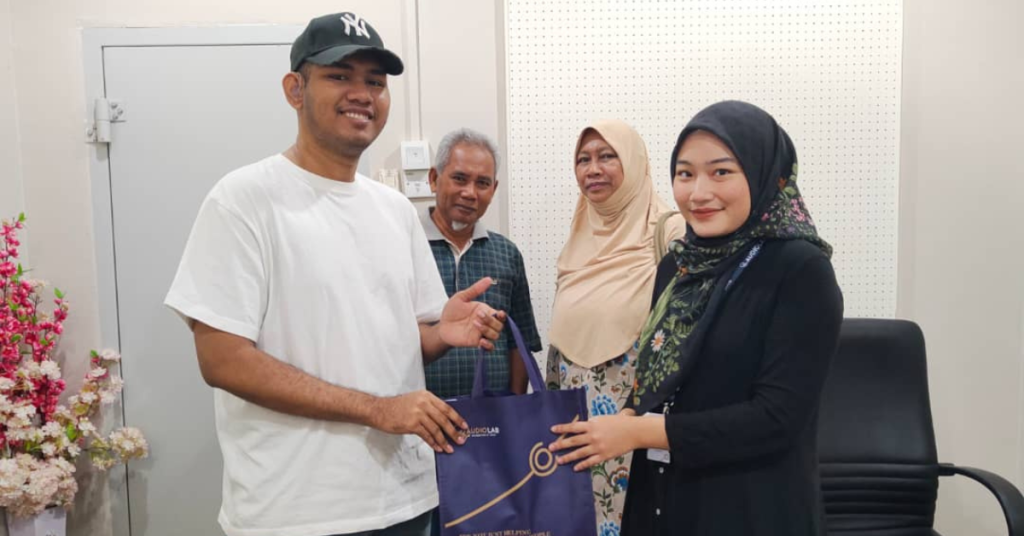
Speaking on this latest partnership with ZUS Coffee, the Managing Director of Audiolab, Mr. Mohd Nor Che Ta said, “We are proud to collaborate with ZUS Coffee to provide life-changing hearing aids to Izzad and Alif. Our mission is to improve the quality of life for individuals with hearing loss, and initiatives like this allow us to make a meaningful impact in their lives.”
“We are grateful for the opportunity to partner with ZUS Coffee, a company that shares our values of inclusivity and empowerment,” added Mr. Mohd Nor Che Ta.
Venon Tian, Chief Operating Officer of ZUS Coffee, expressed his excitement on the partnership as well, stating that the company believes in inclusivity and accessibility for all.
“By teaming up with Audiolab, we can ensure that our baristas with hearing impairments have the tools they need to excel in their roles and provide exceptional service to our customers,” Venon Tian shared.
With close to 28 years of experience in the field, the local healthcare brand prides itself on the ability to help Malaysians rediscover the joy of sound and reconnect them with the rest of the world.
To achieve this, Audiolab focuses on the provision of various hearing aid products and hearing tests and services. Some examples of this include paediatric and adult hearing tests and hearing aid maintenance.
The brand also offers customers advice on the best hearing loss treatments and management on a case-by-case basis. Hearing conditions, lifestyle, and budgets are all taken into consideration during the consultation. Audiolab currently has 22 stores around the country including outlets in East Malaysia, and offers home visits upon request.
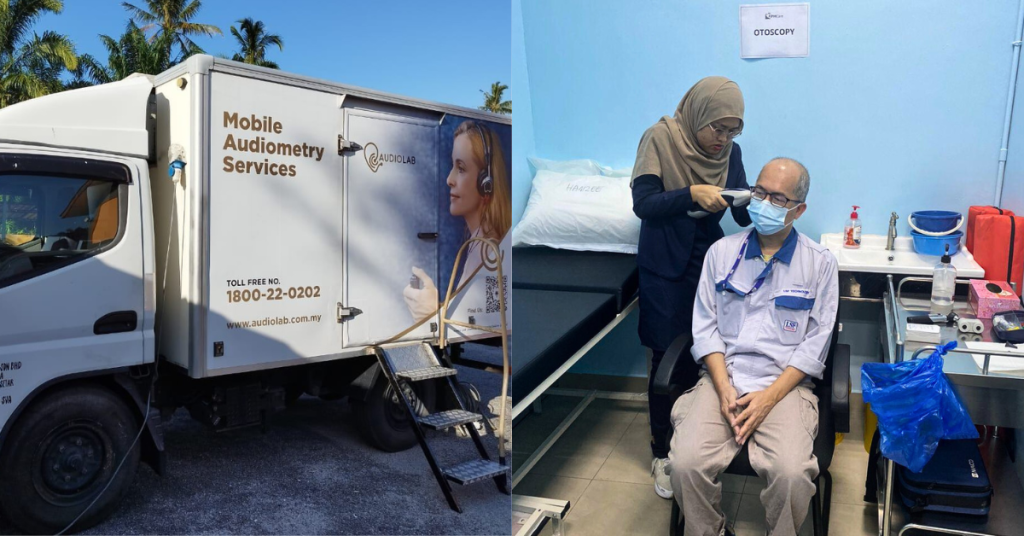
This isn’t the first time Audiolab has partnered with ZUS Coffee. Not long ago, the hearing care centre collaborated with the coffee chain in an effort to promote both brands. By spending more than RM100 at Audiolab, its customers can redeem vouchers for a 10% discount at ZUS Coffee.
Prior to this, the coffee chain had come under scrutiny in 2022 for discrimination against the differently-abled. At the time, a recruiter from its HR department had rejected an applicant after he revealed his hearing disability. The brand issued a prompt apology and launched an investigation into the matter.
With this shared initiative, it seems that ZUS Coffee is working towards redeeming itself and becoming a more inclusive and uplifting company.
- Learn more about Audiolab Hearing Care Centre here.
- Learn more about ZUS Coffee here.
- Read other articles we’ve written about Malaysian startups here.
Also Read: Employees need a Copilot to boost productivity & ease brain drain. This webinar shows how.
Featured Image Credit: Audiolab Hearing Care Centre
Local maritime startup Pyxis launches S’pore’s first electric workboat for port and ship workers
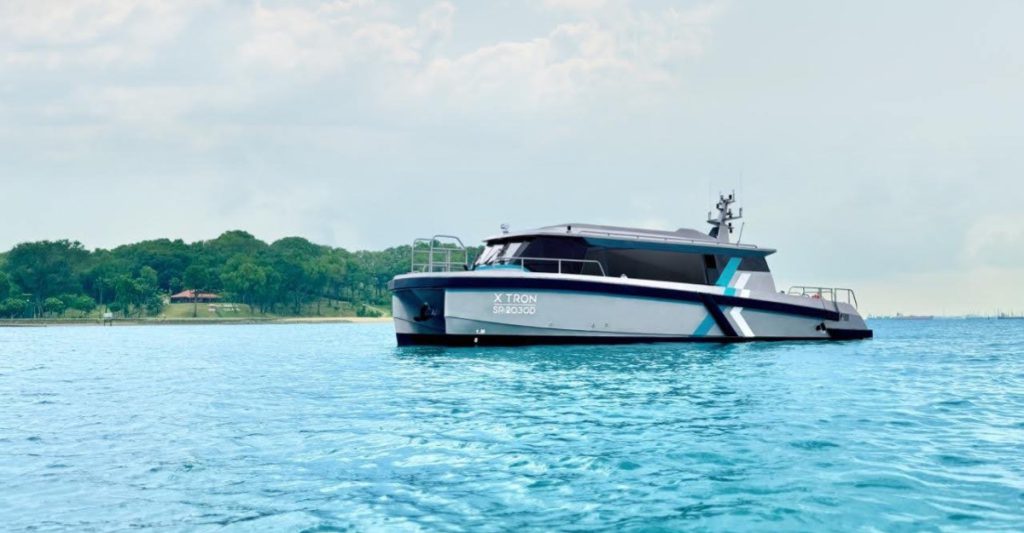
Homegrown maritime electrification technology start-up Pyxis launched Singapore’s first fully electric workboat, the X Tron, on March 27.
With the launch, the start-up aims to provide port and ship workers who shuttle between mainland Singapore and ships anchored in the Republic’s waters with quieter, cleaner and greener rides over the sea.
The X Tron measures 14.8m in length and can ferry up to 12 passengers and a crew of two—similar to conventional diesel equivalents. Its range is up to 50 nautical miles, which is enough for two round trips from its operational base, Marina South Pier, and its surrounding anchorages.
The vessel utilises the same charging port electric vehicles. With a high-speed 150 kW charger, it takes about two and a half hours for it to get to full charge. One such charger will be located at Marina South Pier as part of a trial to be conducted by Pyxis and SP Mobility in April.
Pyxis took 11 months to manufacture X Tron and hopes to eventually get this down to six months in the future.
Pyxis aims to launch more than 100 electric vessels by 2030
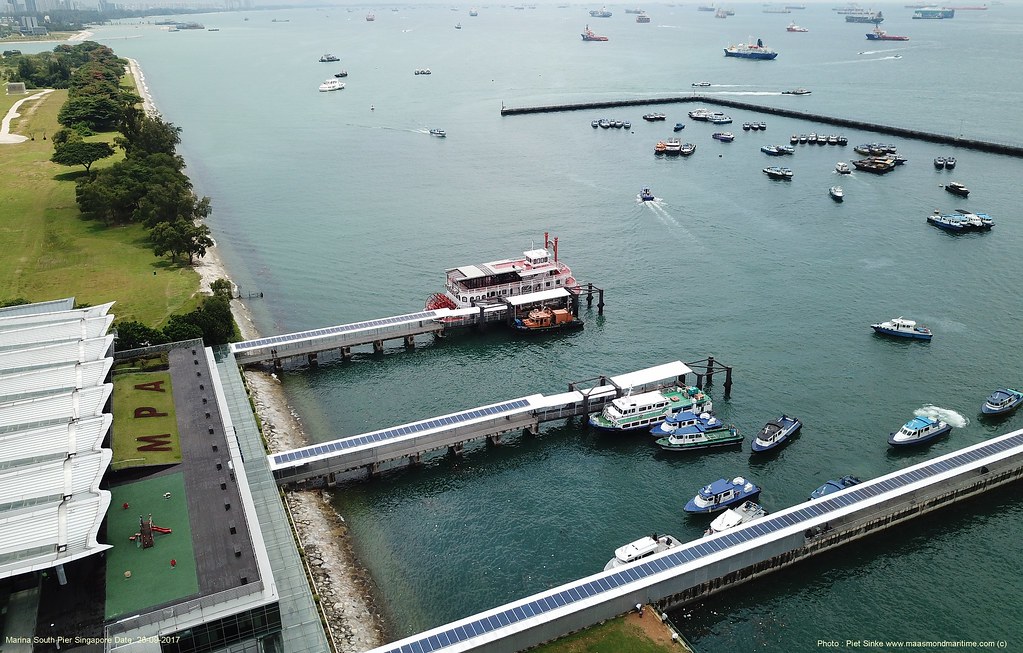
X Tron is the first in a series of electric port passenger vessels made by Pyxis called Pyxis One. The start-up has two other product lines in the works, including the Pyxis R, an electric river boat that can accommodate 50 passengers designed to be used for sightseeing tours on the Singapore River, and the Pyxis L, a more luxurious variant of Pyxis R.
Vessels in the Pyxis One product line, including the X Tron, are expected to save up to 120kg of carbon emissions per hour compared to equivalent diesel vessels.
Including the X Tron, Pyxis now has a total of 13 vessels on its order book. The company aims to deliver all of them by 2026. The start-up’s larger goal is to launch more than 100 electric vessels across the Asia-Pacific region by 2030, it added.
“As frontrunners in the coastal maritime sector, we aim to propel the beginning of a new era in Singapore’s maritime industry by making electrification accessible to all,” said Tommy Phun, Pyxis’ Founder and CEO.
“Pyxis is founded for the industry, by the industry”
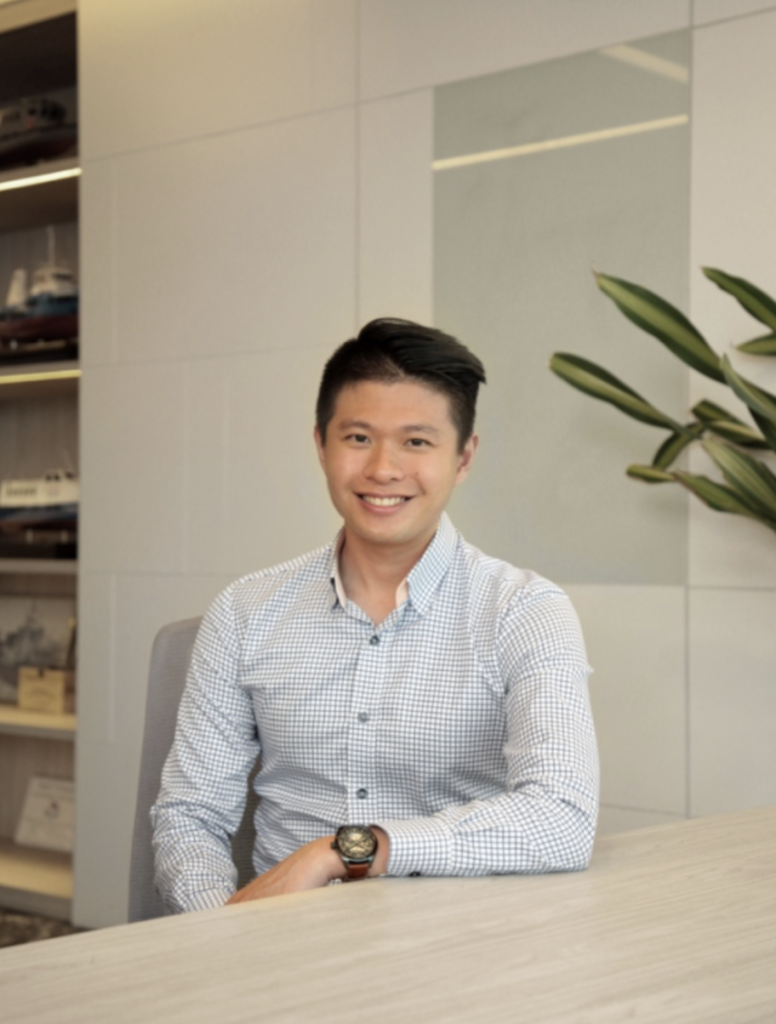
Founded by seasoned industry experts in 2022, Pyxis aims to spearhead the transition to a sustainable, greener and more efficient maritime future in both local and regional ports. In Singapore waters alone, an estimated 1,600 harbour crafts are ready to be electrified.
Earlier in February, the company secured S$4.5 million in a seed funding round co-led by Motion Ventures and Shift4Good. Other participants of the fundraise include Seeds Capital, MarImpact, ShipsFocus, Tian San Shipping, Kim Ann Investments, and LCC Resources.
Alongside Pyxis’ electric port passenger vessels, the company also aims to usher automation and digital transformation in the maritime industry through its digital platform, Electra—an all-in-one platform for fleet management, electric charging, route optimisation, predictive maintenance, and emissions reduction tracking.
Pyxis is founded for the industry, by the industry. It is our strong network, industry expertise, and proprietary technology that allows Pyxis to focus on data-driven designs and optimisations in expanding beyond Singapore to sister ports in the APAC region.
Our team of industry experts is immersed in the intricate workings of the coastal maritime landscape and is united by a shared vision to overcome the sector’s demands and challenges.
– Tommy Phun, Founder and CEO, Pyxis
Featured Image Credit: Pyxis
Also Read: EVs outpace petrol vehicle registrations in S’pore for the first time – BYD claims top spot
Why this KL fine dining spot now sources ingredients locally & won’t chase Michelin stars
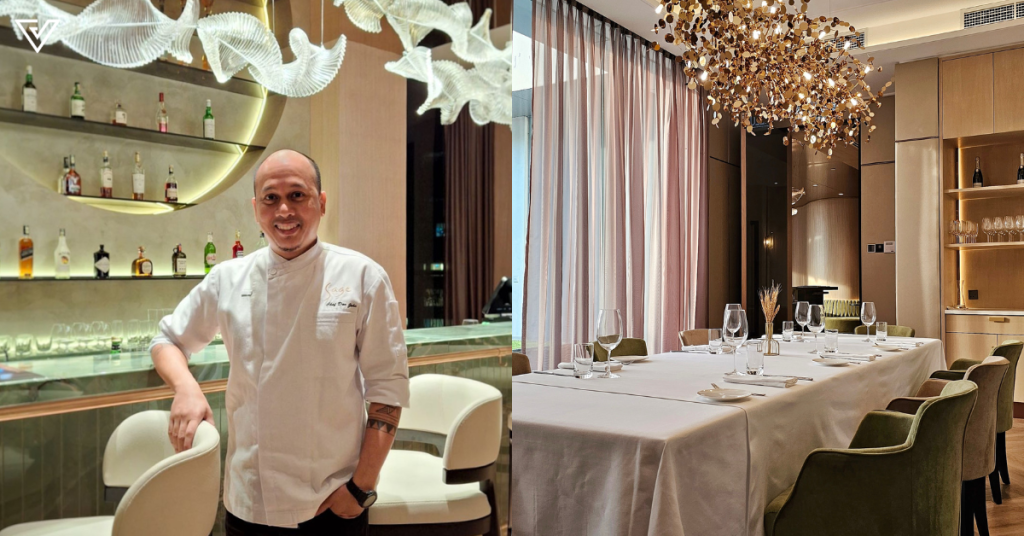
There’s no question that many of us Malaysians tend to think imported ingredients are better.
From Australian dairy to Japanese beef, it’s true that certain imported items have been honed to be of a superior quality. But this shouldn’t lead us to believe that all foreign goods are better than our homegrown offerings.
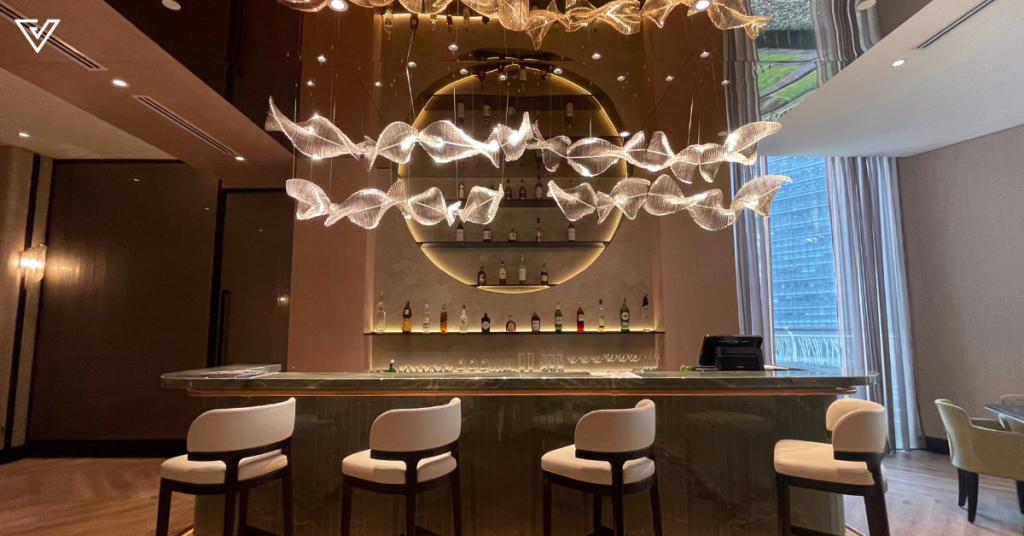
And disregarding taste, eating local food offers environmental benefits and contributes to our economy.
Given all these pros, it makes sense for restaurants to be turning to locally sourced ingredients.
And one restaurant that’s doing so is the newly revamped Sage Restaurant & Wine Bar in The Gardens Residences that reopened earlier this year.
A more approachable ambiance
During our recent visit to Sage Restaurant & Wine Bar, it was clear that its design has changed quite a bit from the old photos we were shown. Gone are the cyan and purple LED lights, replaced by a more mellow combination of sage (of course) and olive tones.
Aligned with this change, the restaurant aims to move away from strict fine dining and instead serve the gap between fine and casual experiences.
This change in target audience won’t really affect the kitchen’s mentality towards their food, the head chef, Don John, told us during a recent visit. Their execution, like always, will be maintained to a high standard.
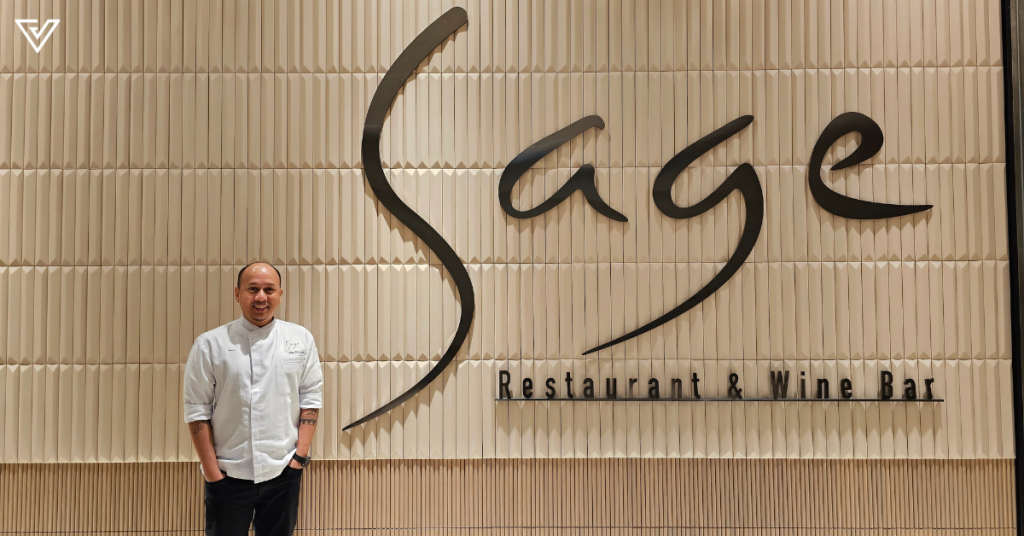
“You can have a casual restaurant, but at the same time, you still can provide five-star food and service,” he pointed out.
Chef Don John also clarified that he would not consider Sage’s food fine dining, which is a label that may be more uptight.
Localising the ingredients
Above its external changes, it’s the restaurant’s culinary approach that’s been impacted the most.
As alluded earlier, one of the biggest differences between the new and old Sage menus has to do with the location sourcing of ingredients.
Chef Don John admitted that using local ingredients can be more difficult as they may require more preparation and workarounds.
Bite-sized review
Expectations were high going into the restaurant, and we’re happy to report that Sage met our checkboxes and more. The smoked octopus and Kobe carpaccio made for incredibly promising appetisers, and each main delivered well-developed and robust flavours, making it hard to choose a favourite.Dessert was on the simpler side, with the recurring house-made vanilla ice cream being a refreshing way to end the meal. Overall, dinner at Sage offered a roster of memorable and delightful dishes.
He elaborated that previously, the restaurant relied on a lot on Japanese ingredients, which oftentimes already come with their own unique flavours that don’t require tweaking.
“Whereas for our local fish and chicken and all, you’ll have to try and work around it so that you bring out the flavours from the local ingredients,” he said. “You need to think, you need to work.”
Yet, this challenge is one that the Sage team is happily taking on.
The head chef shared that Sage has always gone the Japanese-French route, but this fusion cuisine might be becoming a little too common nowadays.
As he put it, “Wagyu is no longer ‘wow’.”
In other words, the flavours offered by Sage has become very similar to many other establishments, including Sage’s sister brand Cilantro.

Thus, going for Malaysian ingredients actually pushes the team to R&D more innovative ideas.
And of course, a big benefit of localising the ingredients is that it supports our local farmers and fishermen, while keeping sustainability at the forefront.
On the topic of sustainability, it appears that the chef also hopes to minimise waste in his kitchen as much as possible. For example, fish bones are being roasted and blended into a powder so they can be used to make dashi.
Maturing with the industry
Having been in the industry for more than two decades, Chef Don John has not only seen changes at Sage, where he has been stationed for the past four years, but also in Malaysia’s restaurant industry overall.
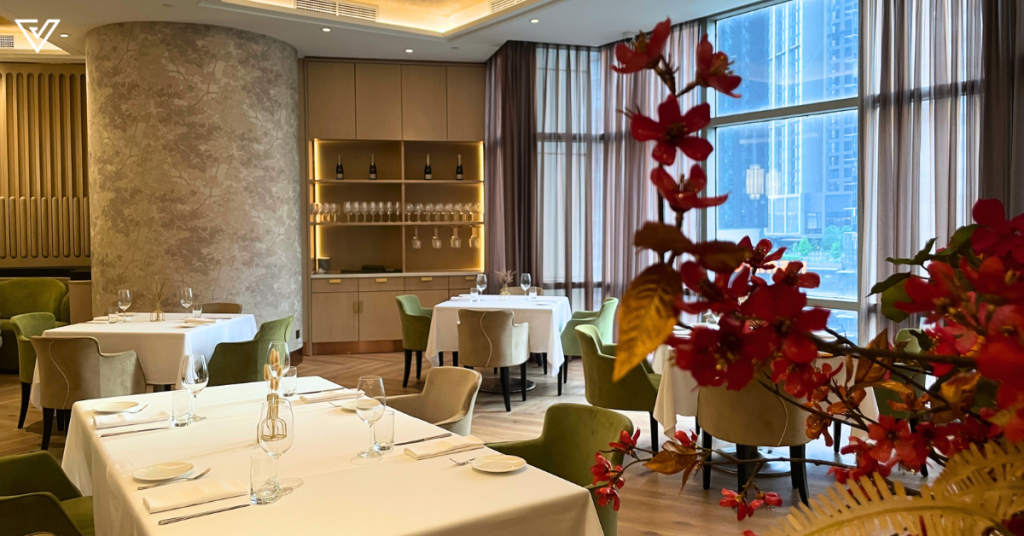
He shared that in the past five years specifically, restaurants have been popping up everywhere. The chef recognised that some of these are more for “fun”, though a number of them are doing it seriously, and as a result are producing quality of food that is on-point.
This, he believes, coincides with the growth of Malaysian diners, who have become more and more educated and confident in their palates.
So, within this growing ecosystem, where does Sage see itself going? Are its eyes, perhaps, set on acquiring the coveted Michelin star?
Of course, this would be an honour that Chef Don John greatly appreciates.
But at the same time, he said it’s not something he personally wants to chase, as it would affect how the kitchen runs, and the types of decision they may make.

Instead of pushing for Michelin recognition and ending up not enjoying themselves, Chef Don John prefers continuing to make good food with good portions that gets good feedback.
(And indeed, that is something they have managed to achieve, as our sister brand DiscoverKL detailed here.)
“To be very honest, I want my kitchen staff, when they leave and everything to be head chefs and executive chefs,” the head chef shared his ambitions. “It’s not about the star thing, or that I want to make money. I think this would be the proudest moment.”
In other words, the chef’s goal is to develop a food scene where more Malaysians get to enjoy good food. And for him, that process begins right in Sage Restaurant & Wine Bar.
- Learn more about Sage Restaurant & Wine Bar here.
- Read other articles we’ve written about F&B businesses here.
Also Read: Employees need a Copilot to boost productivity & ease brain drain. This webinar shows how.
This S’porean wants to take recreational drone-flying to new heights with his “flight club”
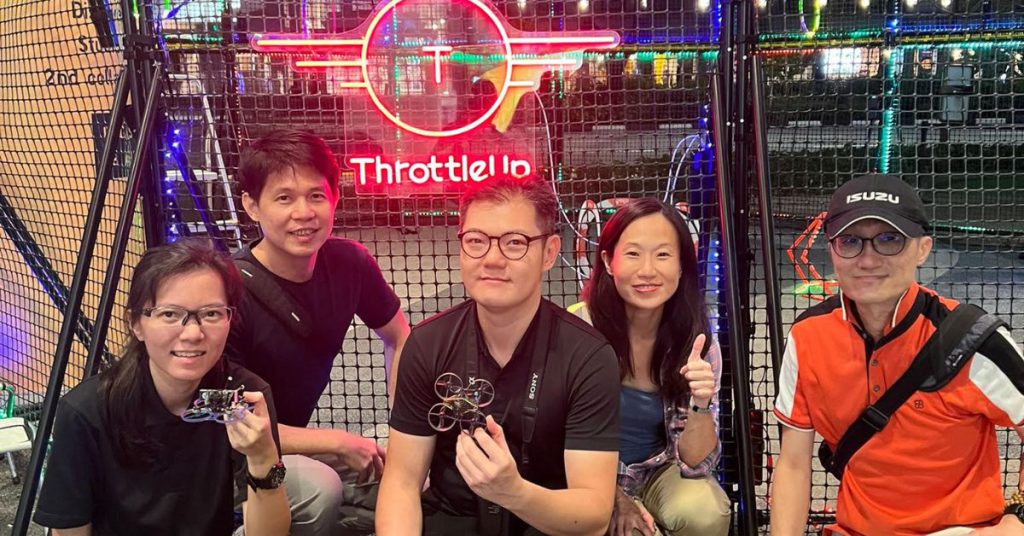
About three quarters of Singapore is a no-fly-zone. That means people who fly their drones here without applying for a permit would get fined heavily and may even go to jail.
At the same time, empty fields or other available places are often being replaced by housing or other development.
All this paired with the high cost of drone equipment as well as the steep learning curve, the barrier to start drone-flying in Singapore is huge.
The activity becomes less and less approachable to the regular person, drones get shelved, and the number of active recreational drone pilots remains low.
A company that seeks to address this gap is FPV (First Person View) Drone videos and photography specialists, ThrottleUp Creation (ThrottleUp).
Throttling into the industry
Deciding that he had worked enough as a business consultant, Tong (also known as Pilot Tong) decided to look for something fun and challenging to do. He ended up finding his answer in drones, obtaining his Unmanned Aircraft Pilot Licence (UAPL) before delving into FPV drones.
“I was shocked that as a licensed drone pilot I was not able to fly a FPV drone. I would crash immediately after taking off,” he recalled. “I set my mind to tame this beast and I was determine to learn flying FPV.”
After mastering the skill, Tong has been focused on FPV filming and coaching.
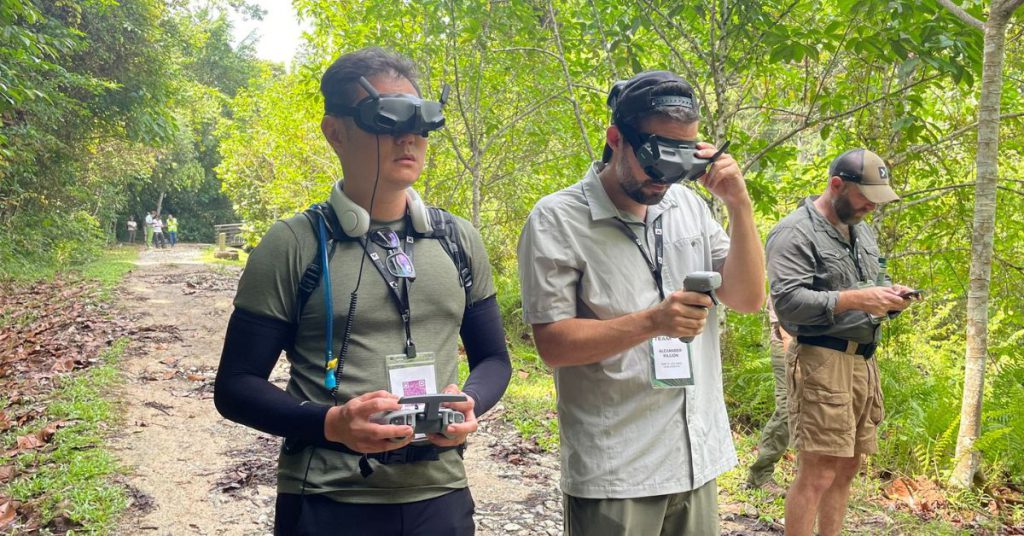
“I feel that in our modern world drone piloting is a life skill, just like cycling and driving,” he said. “It can be more than a hobby, a special identity as a FPV pilot, a career, and it can also save lives.”
Aside from coaching and FPV photography and videography, ThrottleUp also has offerings including The Cage (a mobile enclosure for experiential drone-flying), Drone Tours, and the Flight Club.
All these serve to let the team create more opportunities for drone-flying, given Singapore’s limited airspace.
“Drone has been promoted by corporates and the government as the future. It is included as part of the smart nation strategy. Yet there are fewer and fewer places where the public can fly drones for recreation,” Tong pointed out.
“We hope with our initiatives we can curate more conducive places for drone-flying and gather a community of aspiring drone pilots.”
Welcome to the flight club
After curating places suitable for drone-flying, ThrottleUp launched Flight Club for drone pilots to come together as a motivation to fly more.
“We become better pilots when flying with others whom we can learn from,” Tong said.
While there other casual hobby groups who gather a few people to fly in the country, Flight Club seems to go the extra mile. They tend to provide more conducive places, such as places with toilets, shelter, electricity for charging, setting up drone gates for racing practice, a drone racing timing system, and more.
Tong added, “We also try to make arrangements to fly at exclusive places, so that we don’t need to worry about kids running into our flight path, Karens who will call the police on us, or crashing into someone walking their dogs, which are something we need to take care [with] when flying at public open fields.”

No licence or permit is needed to join them for recreational flying, as it’s not a legal requirement by CAAS (Civil Aviation Authority of Singapore).
But of course, the Flight Club does have some criteria. For new members, they will need to pass a basic online test, and a practical assessment to ensure they can safely and legally operate their drones.
“We will assess their competency and aptitude for safe operation, otherwise they will not be allowed to fly,” Tong explained.
And those who need help to improve their piloting skills can attend ThrottleUp’s courses, of course.
Members will need to own to fly their own drones too, which teaches them how to care for their own equipment—a requirement for being a drone pilot, Tong said.
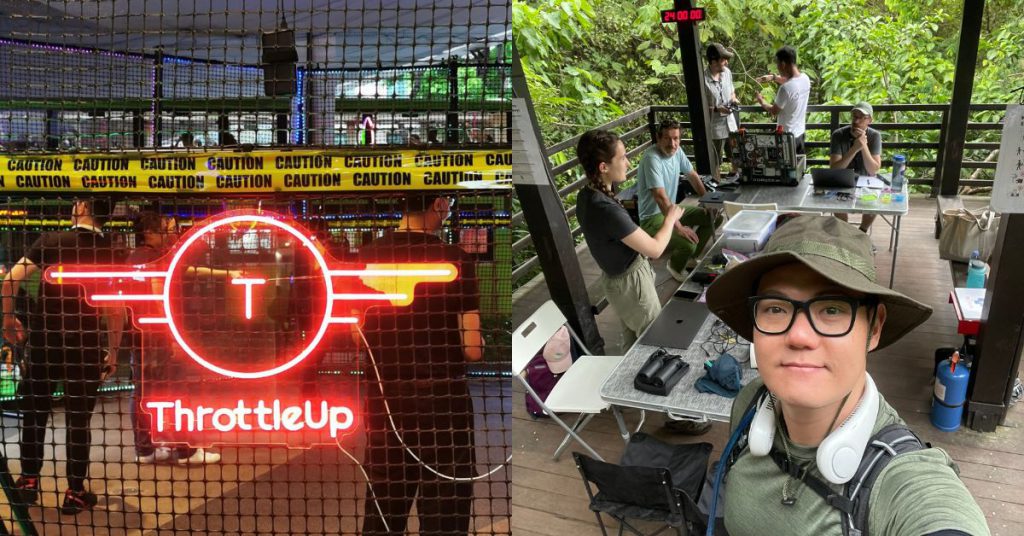
Given all the no-fly zones in Singapore, one of the biggest challenges for Flight Club is finding conducive places to fly. As such, the team has made arrangements with a school to have exclusive usage of their space for flying sessions.
“We hope to have more of such partnerships who are supportive in growing the air-sports scene in Singapore,” Tong shared.
Flying into the tourism industry
Although the flight club just started this year, they already have about 50 members.
The registration fee to join Flight Club is S$240 per year. Flying meetups for these members go for S$50 for adults and S$25 for children (aged 12 and below).
Something else that ThrottleUp has been offering is drone tours, not just in Singapore but to countries like Japan and possibly Switzerland down the road. Tong believes ThrottleUp is probably a pioneer in terms of drone tours in the country.

“The concept is not new; it is similar to photography tour where people go around nice places to take photos. For us, we are flying the cameras,” he explained.
However, in addition to finding nice scenic places for the tour, the team also has to go through paperwork for permits and registrations to make sure the participants don’t break any laws when flying drones overseas.
Developing the industry
Tong’s vision for ThrottleUp is to expand their business overseas by establishing franchises with business partners.
But overall, the core motivator seems to be to develop Singapore’s drone scene, evident through all the coaching services that the company provides. They’ve even collaborated with local institutes of higher learning to offer drone piloting and FPV courses to nurture new pilots.
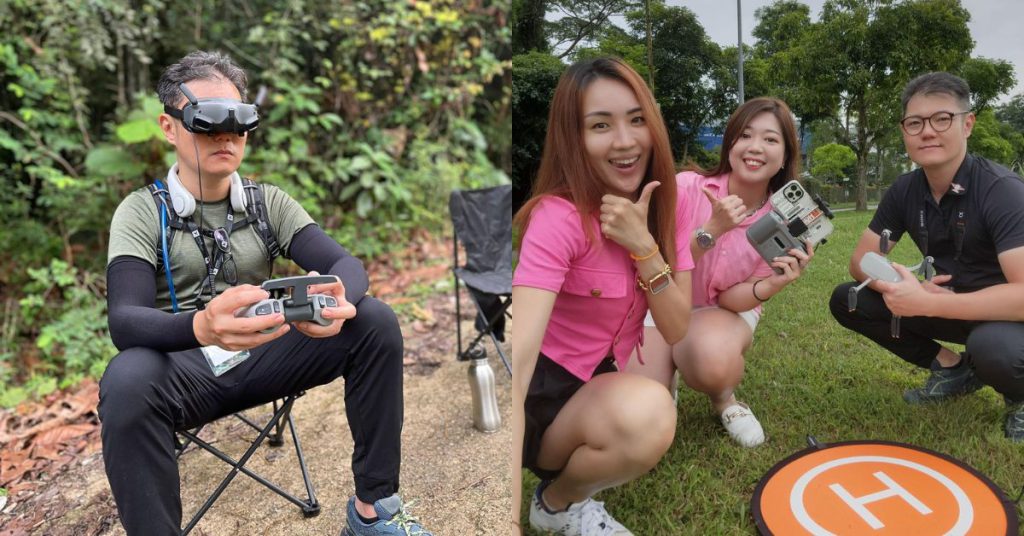
“We are exploring opportunities with government agencies on future-oriented pedagogies in the Training and Adult Education ecosystem for the UAV industry,” he said.
They’ve already engaged with local and overseas research institutions, such as SIT and Yale University, in various R&D projects, including for biodiversity studies and wireless technologies.
From construction to surveillance, it’s clear that the application of drones is increasing across many industries.
And starting with creative and recreational offerings, it seems that ThrottleUp is one of the players at the centre of this growing landscape.
Also Read: Employees need a Copilot to boost productivity & ease brain drain. This webinar shows how.
Featured Image Credit: ThrottleUp
